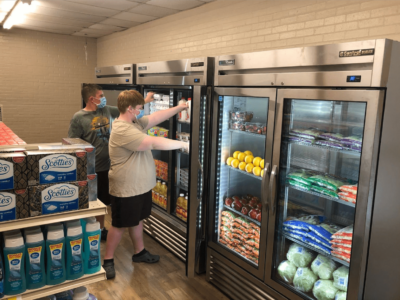Overwhelmed with joy at the birth of his Son John the Baptist, Zechariah burst into song prophesying the destinies of John and Jesus Christ, who would be born just six months later, sent “to give light to those who sit in darkness and the shadow of death, to guide our feet into the way of peace.”
The way of peace, inner peace, and world peace can seem so elusive, especially in the swirl of holidays and uncertainty of a pandemic. As Paul encouraged the Phillippians, “Be anxious for nothing, but in everything by prayer and supplication, with thanksgiving, let your requests be made known to God; and the peace of God, which surpasses all understanding, will guard your hearts and minds through Christ Jesus.” This is easier said than done, but in letting go, we find that underneath are the everlasting arms.
The Peace of Christ
Isaiah foretold the coming of a Messiah who would be called “Wonderful Counselor, Mighty God, Everlasting Father, Prince of Peace.”This holiday season, we are invited to a quieter experience of Christmas, one where we can bring our uncertainties, fears, hopes, and dreams for the new year, to the Wonderful Counselor and Prince of Peace. We are invited to “trust in the Lord with all your heart and lean not on your own understanding.” To experience peace that surpasses all understanding, we have to be willing to not know the outcome, be okay with uncertainty, and live with paradox.
Living the Questions
Rainer Maria Rilke wrote in Letters to a Young Poet: “Be patient toward all that is unsolved in your heart and try to love the questions themselves, like locked rooms and like books that are now written in a very foreign tongue. Do not now seek the answers, which cannot be given you because you would not be able to live them. And the point is, to live everything. Live the questions now. Perhaps you will then gradually, without noticing it, live along some distant day into the answer.”
As Christians, we look toward the day when we will “live into the answer” and be reunited with God in eternity. There will be no more suffering and no more separation, only belonging. Until then, we can take these moments of holiday stress and anxiety as opportunities to practice trust. It’s okay if we don’t always get it right. The act of opening our hearts is enough.
Faith Like a Child
Luke recounted Jesus saying, “whoever does not receive the kingdom of God like a child shall not enter it.” As children of God, there’s so much we don’t know and so much to learn. There are so many explanations that will be revealed as we grow older. That doesn’t stop us from anticipating love, protection, goodness, wonder, and joy. We come into the world believing that we are infinitely, unconditionally loved and cared for, but as time passes, we are taught otherwise. To have faith like a child is to let go of the need to understand everything, and let faith alone be evidence of things unseen. We can believe our heavenly Father when he says “I know the thoughts that I think toward you… thoughts of peace and not of evil, to give you a future and a hope.”
Practical Ways to Destress
Set the Soundtrack
Put on a comforting playlist. Numerous studies show that music affects the way we think and feel, and can release mood-boosting dopamine in the brain. For a heartwarming example of this, watch the documentary Alive Inside.
Give Yourself Permission to Be Exactly Where You Are
Write yourself a permission slip and put it by your bed, or on the bathroom mirror. “I give ____________ permission to ____________.” This could be whatever you need some permission to allow. It could be to feel the way I do, to not be perfect, to let some things go this year. Remember Christmas is just one day. It’s okay to not be okay. You are not alone.
Sit Down
If you’re feeling extreme anxiety, find a quiet place to sit and observe things in the room, naming them out loud or in your mind. “I am here. This is a desk. That is a chair. This is a vase of my favorite flowers. That is a book I am reading.” This establishes a sense of presence in the moment, communicating to the brain that all is well. There’s no need to sound the alarm or send extra cortisol rushing through your body. You can also place one hand on your heart and the other on your belly and take some time to breathe deeply.
Give Yourself a Hug
It really works. Hugging triggers the body to produce oxytocin, dopamine, and serotonin, which are hormones tied to happiness, relaxation, and lower levels of depression. Hugs can actually strengthen your immune system. Try Healthline’s Self-Hugging 101 guide to give yourself a much needed squeeze.
Move
Don’t let anxiety take up permanent residence in your body. Go for a walk, dance to your favorite song, or stretch it out. It’s amazing what a little movement can do to relieve stress, and even sadness.
Get in the Water
Take a bath or hot shower with some lavender or sweet citrus oil. Light a soy aromatherapy candle for an extra relaxing effect. Bring a book with you, or if you’re in the shower, sing your favorite song. Singing can alleviate stress, reduce depression and elevate your mood.
Reach Out
Write a note to a friend or loved one. Sharing small gratitudes or experiences of joy can brighten our mood. Handwriting brings us into a slower rhythm, allowing us to get at the heart of what we’re feeling. Lily Brown, Director of the Center for the Treatment and Study of Anxiety at the University of Pennsylvania, told TODAY: “Labelling your emotional experience, verbalizing your emotions, or writing them down can be helpful for processing anxiety-based emotions in particular… Letter writing might help people open up and be self-reflective in a way that could be helpful.”
Give Thanks
Establish a gratitude practice, whether it be writing five things you’re thankful for every morning, or finding a “gratitude partner” and emailing a list to each other at the end of the day. Find what fits the rhythm of your life and you’ll enjoy the benefits immediately.
Go Face to Face
Next time you pick up the phone to call a friend or loved one, consider making it a video call. Face-to-face communication really makes a difference, especially when we can’t be as connected as we usually are.
Find a Good Story
Read a feel-good book, or watch something that will make you laugh or cry. It’s all cathartic. This list of 150 feel-good films should be enough to get started.
Get Creative
Paint, draw, or bake something delicious, whatever your imagination desires. Studies show doing something creative reduces stress, increases happiness, and even boosts your immune system. Try something you’ve never done before and trust the process.
Do Something Good
“Action feels better than anxiety,” says DoingGoodTogether.org. Check out their list of fun and practical ways to love our neighbors as ourselves. Actively participate in the work of God as foretold by the prophet Jeremiah, “I will heal them and reveal to them the abundance of peace and truth.”





 Copyright
2024
Root and Vine
Copyright
2024
Root and Vine